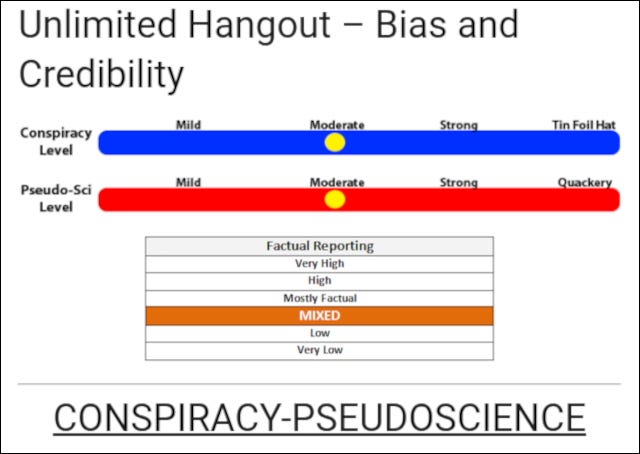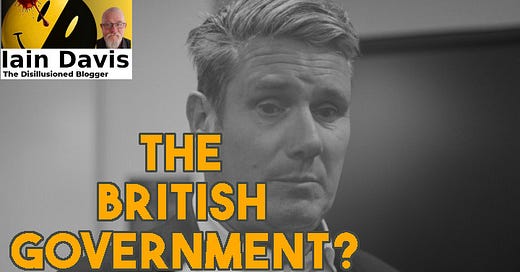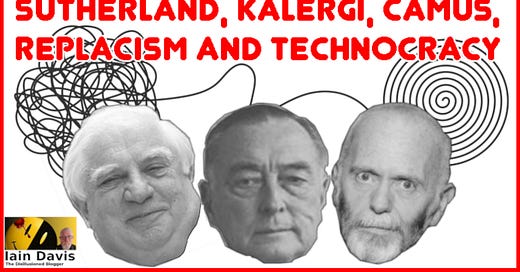
Following a Substack hiatus—I’ve been working on a large project—I thought I would return to the RSS feeds to see wa’gwan.’ This dubious headline from the UK Guardian jumped out at me:
Far-right populists much more likely than the left to spread fake news – study
With my BS-ometer firmly in the red, I thought I would check out this questionable claim. My antipathy for the propagandists at The Guardian (in particular) may be know to some readers, but I thought there were other reasons warranting closer scrutiny in this instance.
The propaganda mood music has changed recently, notably with the seemingly unavoidable election of Trump in the US. That is what my “larger project” has been focused on. Suffice to say everything that glitters is not a gold spray-painted turd, though the Trump administration certainly is. But I digress.
The point is, DEI identity politics has been receiving something of a popular kicking over the last couple of months. About time to, many might exclaim. Woke is definitely broke—or so we are led to believe.
Of course the problem with this is that the important bit of despised progressivism—the social reform that addresses systemic racial discrimination, advocates feminism (the real kind), argues for gay rights and generally seeks to liberate human beings—will also be chucked out in our haste to ignore the lunatic ramblings of the extreme wokists. Sure, butch men claiming “I’m a lady” who insist everyone believes them—or else!—and unhinged pressure groups allowed to deplatform academics just for saying “hang on a minute” should be ridiculed and dispatched to the annals of curiosity as soon as. But, at the same time, we risk imagining that racism, misogyny and homophobia are good things. Which they aren’t.
This narrative shift has even been accompanied by a seemingly broad veering away from the canons of the sustainability faith. Just as Trump pulled the US out of the Paris Accords—again—so the EU shifted its focus to “decarbonisation and competitiveness,” as if the prospective reality of powering European industry with windmills had just dawned on them.
All of it is flim-flam. All we are actually seeing is a sharper focus on what sustainable development has always been about—not reducing but offsetting emissions using Emission Trading Schemes (ETS). The rainbow terminating pot is a $22 trillion carbon market. What’s not to like?
So rather than freeze to death—in the obvious absence of any notable global warming, sorry, I mean “climate change”—why not just take Trump at his word and “drill, baby drill”? No worries, carbon neutrality can still be achieved by building massive carbon capture and storage plants for no reason. . . .well, other than maximising investor’s ROI that is.
None of this has played out well with the Guardian’s more woke-oriented propagandists. Undeterred, as the self-appointed guardians of da troof, they have stepped up their offensive and have now decided that “misinformation” more commonly emanates from those utter bastards on the alleged far-right of the political spectrum. This, they assert, is based on the Science™ and is therefore provably true.
In the aforementioned article, Jon Henley—the Guardian’s Europe correspondent—wrote:
Far-right populists are significantly more likely to spread fake news on social media than politicians from mainstream or far-left parties, according to a study. [. . .] The data showed conclusively that far-right populism was “the strongest determinant for the propensity to spread of misinformation”, they concluded.
There you have it then!
But wait a moment! There is an apparent caveat:
The researchers scraped factchecking and fake news-tracking services to build a dataset of 646,058 URLs, each with an associated “factuality rating” based on the reliability of its source – and compared that data with the 18m URLs shared by the MPs. By crunching all the different datasets together, the researchers were able to create what they described as an aggregate “factuality score” for each politician and each party.
“Factchecking and fake news-tracking services”? Don’t forget this is the Science™ so presumably these data sources are objective and reliable.
According to the research paper the Guardian relies upon, those sources were Media Bias/Fact Check (MBFC) and the Wikipedia Fake News list (WFNL).
So, the “researchers” scraped a load of tweets from politicians and searched them for whatever they judged to be “misinformation.” Said misinformation was identified wherever MBFC said it was or whenever the offending tweet referenced or linked to a site listed as “fake news” by Wikipedia. The resultant data sets were analysed and the researchers ascribed a corresponding “factuality score” to each politician. Thereafter they categorised their results by party affiliation to determine which political wing was spreading said “misinformation.”
You may have spotted the slight flaw in this scientific methodology. If MBFC’s definition of “misinformation” is baseless junk, and if Wikipedia’s “fake news list” is subjective politically motivated pap, then the researchers “factuality score” is equally total crap, not to mention scientifically meaningless.
To even begin to unpack this suspected drivel we are forced to entertain the circular logic of a mutually reinforcing network of propagandists. It is completely nonsensical and impossible to rationalise but it’s the thought—such as it is—that counts.
The WFNL declares that “Fake news websites are those which intentionally, but not necessarily solely, publish hoaxes and disinformation for purposes other than news satire.” This is a definition of disinformation (intentionally misleading) not misinformation (unintentionally misleading). The scientific researchers, and subsequently The Guardian, have their definitions mixed up.
But who cares about such minor scientific discrepancies? Just trust the Science™ God damn it!
The WFNL further defines a “fake news site” as any “that have been assessed by fact-checkers as fake news websites.” So the WFNL is entirely based on the assessment of the vaunted factcheckers like MBFC.
Therefore, the researchers actually relied on one source for their “factuality score.” They incorrectly, or misleadingly, claimed they cross referenced independent sources. Therefore their “comparative examination” was scientifically illiterate gibberish.
Whatever!
MBFC is the website purportedly owned by the mysterious Dave Van Zandt. It professes to be “the most comprehensive media bias resource on the internet.” Just call me Dave—whoever he, they, or it might be—is apparently an “arm chair researcher” with no experience as a journalist, researcher or anything else vaguely related to his alleged area of expertise. He once supposedly conceded he’s "just a person who is interested in how media bias impacts politics”—which is good enough apparently.
Dave added:
I simply have a background in communications and more importantly science where I learned to value evidence over all else. Through this I also became interested in research of all kinds, especially media bias, which is difficult to measure and is subjective to a degree.
Presumably disappointing himself over all else, Dave hasn’t provided any evidence to back up any of his personal claims but his research is used by the Atlantic Council no less, so Dave must be brilliant at whatever it is he supposedly does. Mind you, he (it, they, them) also said he had more than 25 years experience writing for print and online media. When that turned out not to be true, this part of Dave’s reported “bio” was scrubbed.
MBFC’s alleged methodology is very similar to that used by the scientists who produced da troof reported by the Guardian: it is abject nonsense.
Dave promises to “assess media outlets’ ideological bias” by comparative analysis with, what amounts to, his personal opinion—although he alleges there’s a team behind it who share his personal opinion. If Dave doesn’t agree then the source is biased, if he does it isn’t. While the so-called methodology is described using jargon—"comprehensive, weighted scoring system" and "objective indicators," etc.—it all amounts to Dave’s opinion and garish, outdated graphics.
Take for example Dave’s Economic Scoring system. If you believe in economic central planning or, at the other end of the scale, free-markets that is bad and you are biased. Only balanced reporting of “regulation and corporate influence” is good and therefore not biased in Dave’s opinion. Public-private partnership stakeholder capitalism “good,” everything else bad.
This kind of stuff leaves Dave to conclude that the perfectly unbiased, and therefore only legitimate political opinion for a media outlet to express is “a neutral stance on social values, incorporating multiple viewpoints.” While this “neutral stance” is something we might hope to see in political science, scrupulous objectivity is not something we usually associate with journalism. Not least of all because such journalism would be really boring and it is bad enough already without insisting it has to be beige.
Journalism, as opposed to science, is supposed to be thought provoking and engaging. Really good journalism forms compelling narratives based upon evidence and reported facts, but it does not profess to be opinion-free, sterile data analysis. If it were, no one would read it.
News reporting is, and always has been, offered to readers allowing them the opportunity to make up their own minds about what they believe. Where it insists you believe everything it reports without question—that you should “trust” it—it is not journalism but propaganda.
The Guardian piece we are discussing has not adopted “a neutral stance on social values, incorporating multiple viewpoints.” Notably, Dave consider the Guardian to have a Left-Center bias. All well and good, but so what?
Herein lies Dave’s fundamental misconception. No one needs Dave to tell them what the Guardian’s political stance is. The Guardian’s article is, as Dave says, Left-Center, but I am certain I am not alone in being able to figure that out for myself.
People choose to read whatever “news” they want because it aligns with their own values. The danger lies in people not acknowledging this about themselves and thereafter assuming that whatever they have read is da troof. This risk increases if the reporting outlets claims you should trust it and offers whatever opinion it reports as said troof.
The Guardian asserts that “facts are sacred” and claims to venerate honesty; integrity; courage; fairness; and a sense of duty to the reader and the community. The Guardian article we’re scrutinising is almost completely devoid of facts and appears to be duplicitous.
Dave’s own methodology recognises that judging bias is “inherently subjective.” For purported political scientists to then use Dave’s subjective opinion as a basis for their study has nothing to do with any known scientific method. We can criticise, and I am criticising, the Guardian for unquestioningly reporting a study to their readers as factual or accurate when any self-respecting journalist should have been able to dismiss it as absurd nonsense and not bothered to have reported it at all.
Dave’s subjective “fact” checking led MBFC to label Principia Scientific International (PSI) a peddler of “conspiracy-pseudoscience.” PSI issued a Cease & Desist legal notification of intended action against Dave. This didn’t phase Dave at all, and he still rates PSI as “a strong conspiracy and Pseudoscience website.” Dave knows this is true because PSI questions the Climate-Science™ which is the wrong thing to do because the United Nations and the US government, among others, insist the planet is “literally on fire.” And, as Dave points out, it really is because reasons, so there!
It turns out, as an occasional contributor to Whitney Webb’s Unlimited Hangout, I too am embroiled in what Dave calls “right conspiracy-pseudoscience.” To substantiate his opinion, Dave asserts that Unlimited Hangout falsely reported a US government Bill proposing to to microchip people with mental disabilities and a UNICEF study claiming that pornography wasn’t necessarily harmful for children which UNICEF deduced by making children watch pornography.
To “debunk” this alleged Unlimited Hangout—and Whitney Webb—misinformation, Dave cites FactCheck.org and the independent fact checker Misbar respectively. This is how so-called fact checking and, in this case, faux political Science™ operates. It is self-referential to the extent it disappears up its own backside.
With regard to the microchipping debunk, Whitney Webb correctly reported the Bill—dubbed Kevin and Avonte's Law—focused on tracking people with learning disabilities and neuro-divergent disorders. This is what Dave alleges to have been officially debunked, but that isn’t what the “fact check” he referenced actually debunked. Factcheck.org purportedly debunks the entirely separate claim that the Bill threatens to microchip “all Americans.” It acknowledges the purpose of the Bill was to expand the “locative tracking technology programs” to people with cognitive disabilities.
What Webb actually reported was there were “no restriction on the tracking programs inclusion of other individuals.” This was factually correct. Dave’s original accusation of falsity was not only itself inaccurate and misleading he then incorrectly claimed he was right by referencing a claimed debunk of a report Webb never made.
Dave’s allegation that Webb spread misinformation regarding the UNICEF report is based on the fact she re-posted an article published by the Center for Family & Human Rights (C-Fam). The article criticised a 2021 UNICEF discussion paper. When she shared the article Webb said “UNICEF, the UN's "child charity", should be investigated immediately for signing off on this garbage.”
Once again, we see the same deception used by Dave. This is the claim he attributed to Unlimited Hangout which, he alleges, is provable “false”:
A new UNICEF report on children’s online activity said that pornography may not always be harmful to children. They conducted this research by watching children view pornography.
But neither Webb nor C-Fam reported that UNICEF conducted research by “watching children view pornography.” Dave has simply made that up. That said, obviously the research UNICEF relied upon was the result of children reporting their experience having “seen” pornography.
Dave’s referenced Misbar debunk defends the UNICEF paper and challenges the C-Fam claims. Misbar asserts “at no point does the paper deny that pornography is not harmful” and further “data came from children’s responses to questions, not from viewing pornography.” Misbar simply denies that children saw any pornography and flatly states the children’s “reactions were not in relation to pornography.”
The UNICEF discussion paper clearly stated:
There is no consensus in the degree to which pornography is harmful to children. [. . .] most children who saw sexual images online were neither upset nor happy. [. . .] Between 3 per cent of children (in Estonia) and 39 per cent (in Spain) reported feeling happy after seeing such images [online pornography].
Misbar’s so-called debunk is mealymouthed apologist tripe. Evidently, the UNICEF paper was highly suspect “garbage” which both explains why it was hastily removed by UNICEF and accounts for Webb’s anger that it was ever commissioned in the first place.
We’ve only examined a couple of these so-called fact checks, but it should be noted, in its determination that Unlimited Hangout is a “right conspiracy pseudoscience” outlet, the only proofs MBFC (Dave) provides are not only hopelessly inaccurate and entirely subjective, they don’t even relate specifically to Unlimited Hangout.
The Science™ The Guardian reported—supposedly justifying its claim that “far-right populists” are more likely to spread fake-news—is a specious hodgepodge of subjective opinion and makey-uppy allegations. It isn’t even coherent, let alone scientific.
Of course The Guardian is free to offer whatever opinion it likes, but if it is going to claim, as it does, that the “data showed conclusively” that far-right populists spread misinformation more than far-left populists then, by omission, The Guardian is at the very least spreading misinformation. Given how pathetically unscientific the referenced paper obviously is, it is reasonable to accuse The Guardian of deliberately misleading its readers: spreading disinformation.


















Left and right are an illusion. Why use these labels designed to divide us and draw our attention away from the bad faith actions of those who claim to represent us? I’m despise Starmer. I’m no fan of Donald Trump. I don’t identity as left or right. There are likely millions like me.
What you say is fair enough, of course, but it doesn't change the fact (yeah, it is a fact cos I checked it - all by myself) that a bunch of far-right patriarchal bigoted misogynist homophobic transphobic evangelical cult-like fuckers are still a bunch of far right patriarchal bigoted misogynist homophobic transphobic evangelical cult-like fuckers.
And it's also a very disturbing fact that this sort of cultish attitude has been very successfully infected into the conspiracy theory subculture over the last, maybe 5-10 years or so, under the guise of 'anti-woke'. Yes, of course it's true to a certain extent that there are subversive deep state types shit-stirring on the 'woke' side, but this is designed to help their other section of evil shit-stirring cognitive infiltrators on the other side to morally corrupt the dissident movement, such that they become indistinguishable from the aforementioned populist far-right evangelical bigots. It's an exceptionally well conducted act of subversion/psyop. The so called truth movement was never like this before that 5-10 years ago.
And the fact that this 'populism' is obviously mainstream and the likes of Farage are given disproportionate airtime should tell you there's an agenda there. And that agenda is the installation of (far right) fascism. It's not just in America, it's in Europe too. To get so many dissidents to support it is an act of evil genius.
They've clearly decided that Brave New World isn't the option for them. So it's 1984 all the way down from now on.